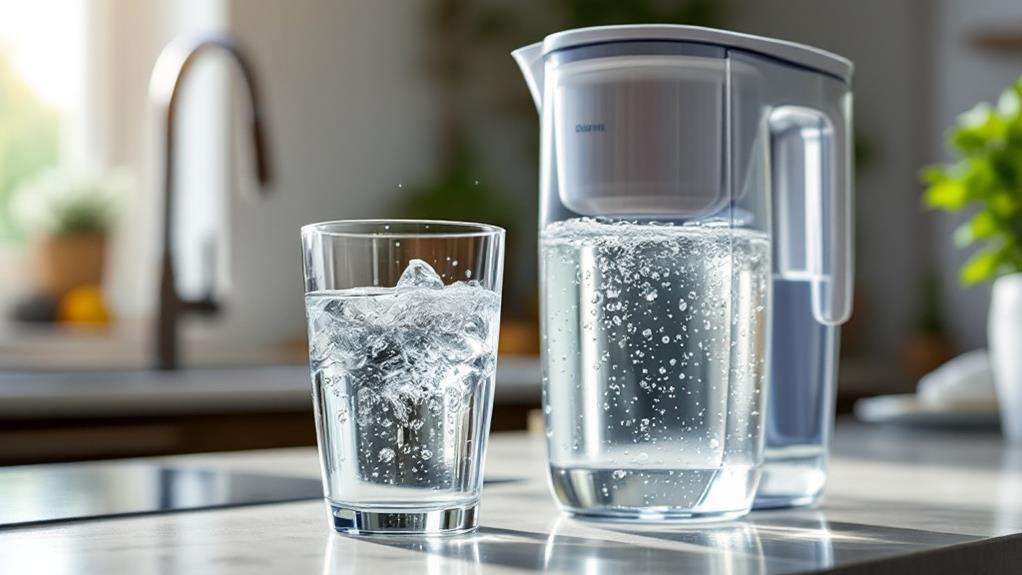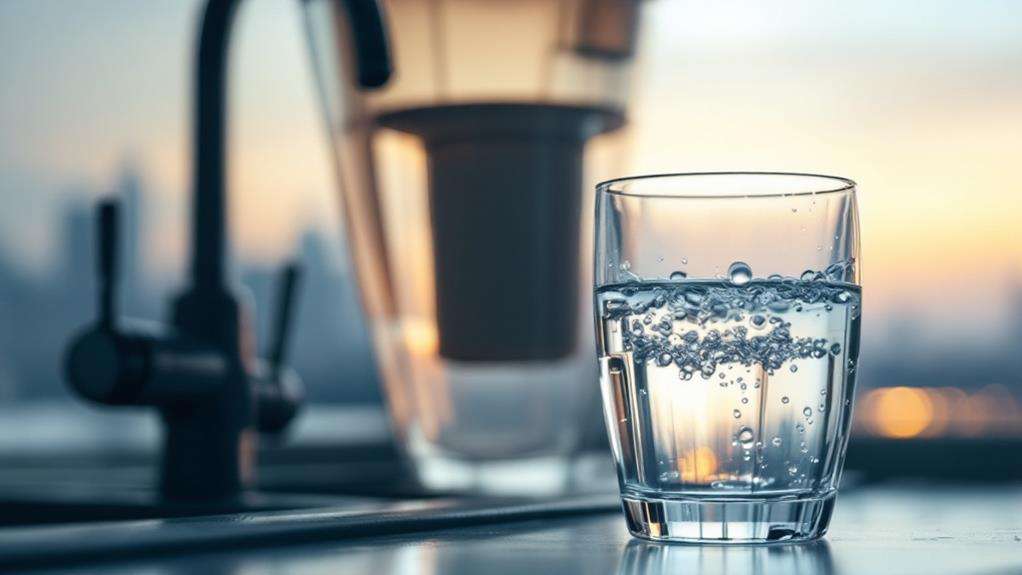Do You Need a Water Filter If You Have Municipal Water?
While municipal water undergoes treatment, it can still contain contaminants like chlorine, lead, and disinfection byproducts. You don't always need a water filter, but using one can substantially improve your water's taste and quality. Filters remove harmful substances, extend appliance lifespans, and provide peace of mind. Signs you might need a filter include unpleasant tastes, odors, or visible sediment. Consider whole-house systems for complete protection or under-sink filters for drinking water. To determine if you need a filter and which type is best, it's important to understand your specific water quality issues and filtration options.
Municipal Water Treatment Process
Three key steps make up the municipal water treatment process: sourcing, treatment, and distribution. Your local government's water department manages this system to guarantee your tap water meets federal and state safety standards.
The process begins with sourcing water from rivers, lakes, or groundwater. Next, the water undergoes treatment to remove contaminants and make it safe for consumption. Municipal water treatment primarily focuses on eliminating biological threats like bacteria, parasites, and viruses. Common disinfection methods include adding chlorine or chloramine to the water supply.
After treatment, the purified water is distributed through a network of pipes to your home. However, it is crucial to acknowledge that while this water purification process is thorough, it doesn't address non-health related issues such as hard water, sediment, or taste.
To maintain water quality, daily testing and certification by regulatory agencies are conducted. These water tests confirm the safety and compliance of your City Water. However, aging infrastructure can sometimes introduce contaminants during distribution. If you're concerned about your tap water, consider a water analysis or water filter installation to further improve your water quality.
Potential Contaminants in City Water
Despite rigorous treatment processes, municipal water can still contain various contaminants that may affect its quality and your health. You might be surprised to learn that your tap water could have chlorine, fluoride, lead, copper, nitrates, and disinfection byproducts. These substances can impact the taste, odor, and safety of your drinking water.
If you live in an area with older infrastructure, you're at higher risk of lead and other metals leaching into your water supply. The residual chlorine used for disinfection can leave an unpleasant Chlorine Taste and contribute to the formation of carcinogenic compounds. Hard water, rich in calcium and magnesium, can cause scale buildup in appliances and leave your skin and hair feeling dry.
To certify clean drinking water, many homeowners turn to Water Filtration systems. Options like reverse osmosis and activated carbon filters can effectively remove these contaminants, improving Water quality and taste. Filtered water can provide peace of mind, knowing you're drinking the purest water possible. Consider investing in a Drinking Water Filter to address these potential issues and enjoy better-tasting, safer water straight from your tap.
Benefits of Additional Filtration

While municipal water treatment facilities work diligently to provide safe drinking water, additional filtration at home can offer numerous benefits. If you're concerned about the quality of your water supplies, installing a water filtration system can address many common issues.
A whole-home water filtration system can remove harmful contaminants that may have slipped through municipal treatment processes. These systems often use activated carbon filters to eliminate chlorine, heavy metals, and other impurities, resulting in better-tasting and safer drinking water throughout your home. Additionally, filtered water can extend the lifespan of your appliances and plumbing by preventing scale buildup and corrosion.
For those who don't need or want a whole-house system, a point-of-use filter at your kitchen tap can provide an extra layer of protection for your drinking and cooking water. These filters can further reduce risks associated with contaminants like lead, microorganisms, and disinfection byproducts that may be present in municipal water.
Signs You Need a Filter
Even with municipal water treatment, certain signs may indicate that you'd benefit from additional filtration at home. If you notice a slight blue tint in your water, it could suggest the presence of copper, which may require a specific water filter to address. Unpleasant tastes or odors in your water are also clear indicators that you need a filtration system. These issues can stem from chlorine, sulfur, or other contaminants that affect the quality of your drinking water.
Visible sediment or particles floating in your water are unmistakable signs that you need a Sediment Filter. This type of filtration can remove dirt, rust, and other particulates that may have entered your water supply. If you're concerned about your health and safety, investing in a sink water filter or whole-house system can guarantee peace of mind. Additionally, if you've experienced recurring water problems, such as staining on fixtures or appliances, it's a strong indication that you need a filtration solution. By addressing these issues, you can ascertain that you're consuming pure water and protecting your home's plumbing from potential damage.
Choosing the Right Filtration System

Selecting the right filtration system for your home starts with understanding your specific water quality issues. To make an informed decision, you'll need to conduct water tests to identify contaminants like lead, chlorine, or calcium or magnesium that cause hardness. These results will guide your selection of treatment options.
For thorough water treatment throughout your home, including the swimming pool and well water, a whole-house filtration system might be the best choice. This option guarantees clean water for all purposes, from drinking to bathing. If you're primarily concerned with drinking water quality, an under-sink filter system for drinking water may suffice.
If you're dealing with hard water, you might want to consider combining a Water Softener with a Water Filter System. This dual approach addresses both hardness and contaminant removal, improving water quality for skin and hair as well as appliance efficiency.
